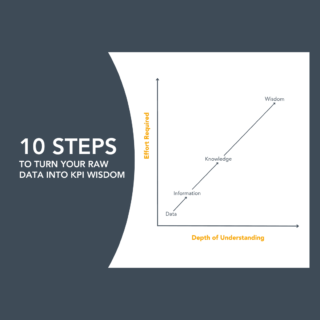Ask leaders if performance measurement is critical to their organization and most of them will clearly answer “yes”.
But rarely do they question what their organization’s motivation, processes, or ROI were when they started creating the key performance indicators (KPIs).
If they paused for a moment to consider those same things now, they might find they would be better off cutting their losses and stop throwing their money on top of a heaping pile. That heap is probably a pile of staff cynicism, fear, misunderstanding, and poorly-chosen, wastefully-implemented, misused KPIs.
If you are worried that you might be wasting time, money and energy on your KPI system, look for these 4 key indicators in your organization’s performance measurement venture so you can switch gears.
Sign of Waste #1: Leaders use measures to judge people’s performance rather than improve the process’s performance.
If you’re certain that measures are used as tools to judge people, stop measuring. When people feel that measures are solely used as blame and punishment (or even reward), a culture of fear, mistrust or defensiveness develops.
Performance improvement only works in a climate of trust, openness, experimentation and learning, which is the complete opposite of fear and defensiveness. So work on the culture first, making it okay to make mistakes, learn from them, encouraging teamwork and problem-solving. That way you can then delve into root causes of why performance is not improving, rather than blame.
Sign of Waste #2: People don’t understand the difference between working “in” the business and working “on” the business.
If people don’t understand the concept of performance improvement, of working “on” the business and not just “in” it, that’s another sign that your KPIs are likely a waste of time and money.
Some organizations or businesses have a culture where people turn up to work each day, do their hours, and then get paid. They’re simply selling their hours to the organization. They don’t feel any responsibility for improving the success or the results of the organization. They are just ticking off tasks to be done one by one.
Until you can turn the culture around into one that understands that performance is measured by results and impact, and not just by effort, your organization’s performance measures will be resisted or treated with cynicism.
Sign of Waste #3: People won’t make the time to do it properly.
Another sign that you are wasting money on your performance measurement campaign is when people insist they cannot make time for it. They might say, “We’ll just have to fit it in… Somehow…” What they’re really thinking is, “I’ve got “real” work to do …”
Just fitting performance measurement and improvement into the whirlwind of everyday work is not good enough. If you are noticing that people aren’t showing up for meetings, regularly rescheduling them, or that energy is low, and resentment is high, you should be worried about waste in your attempt to produce great measures.
Instead, you need to be confident that people will make time to work “on” the business and develop meaningful performance measures, even if it means that something else is delayed or cancelled. Why? Because if you’re not measuring performance, you’re not managing it, and if you’re not managing it, there will be lots of things you’re doing that equate to waste or rework – and you probably don’t even know what they are.
Sign of Waste #4: You’re developing KPIs the same old way.
There’s an overwhelming tendency in business and government to assume that measuring performance is easy: (1) Just brainstorm some KPIs (2) develop a dashboard (3) then freak out when this month is worse than last month. Sound familiar?
Most of the common practices in creating, implementing and using KPIs are really just bad habits. These habits mean that you struggle, when you shouldn’t be.
You shouldn’t struggle:
- To measure intangible goals
- To find measures that are more meaningful than trivial activity milestones
- To report measures in a way that inspires teams to action
- To interpret signals from your measures, and choose improvement initiatives that actually work
To reduce the waste in your performance measurement campaign, you need a proper KPI approach that helps you design and use measures more meaningfully. If you have a measurement campaign that assumes all you need is “conversation”, “brainstorming”, “SMART”, “KPI libraries”, or “dashboards”, you’ll create a massive mess that is hard to recover from.
This blog was adapted from a blog originally posted on Stacey Barr’s website.



